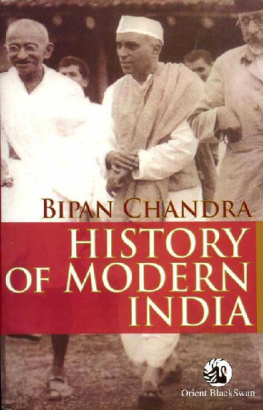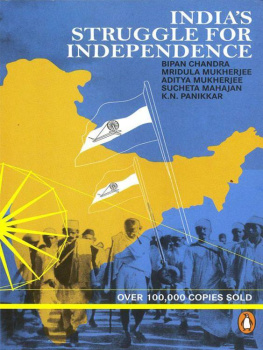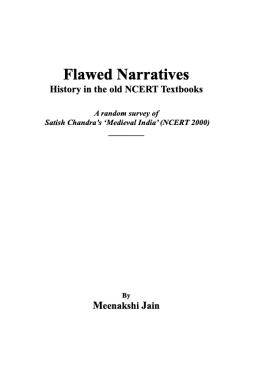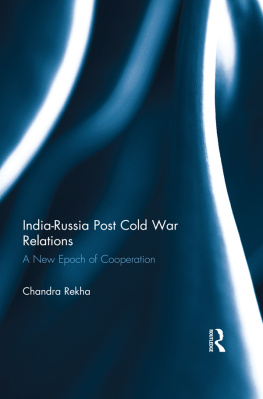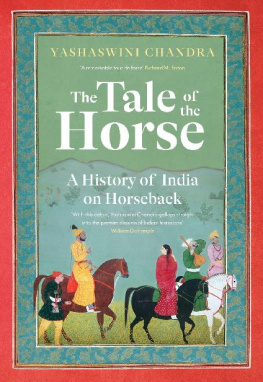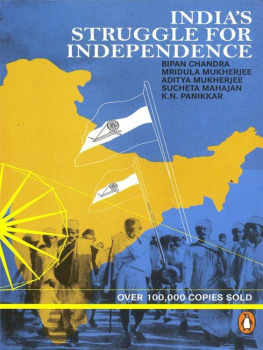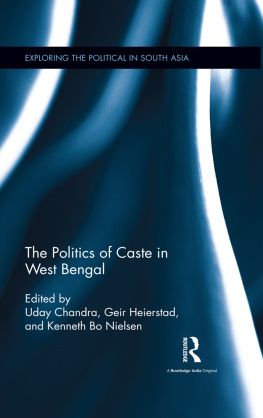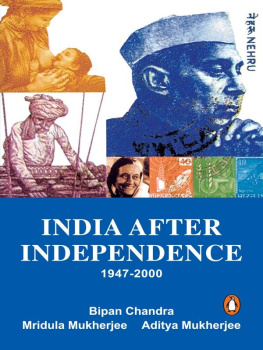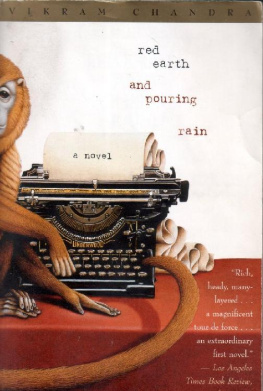History of Modern India
For our entire range of books please use search strings " Orient BlackSwan ", " Universities Press India " and " Permanent Black " in store.
History of Modern India
BIPAN CHANDRA
HISTORY OF MODERN INDIA
Orient Blackswan Private Limited
Registered Office
3-6-752 Himayatnagar, Hyderabad 500 029 (A.P.), INDIA
e-mail:
Other Offices
Bengaluru, Bhopal, Chennai, Guwahati, Hyderabad, Jaipur,
Kolkata, Lucknow, Mumbai, New Delhi, Noida, Patna, Vijayawada
Orient Blackswan Pvt. Ltd. 2009
First published 2009
Reprinted 2009, 2010, 2011, 2012, 2013, 2014, 2015, 2016
eISBN 978-93-5287-435-4
e-edition: First Published 2018
ePUB Conversion: .
All rights reserved. No part of this publication may be reproduced, distributed, or transmitted in any form or by any means, including photocopying, recording, or other electronic or mechanical methods, without the prior written permission of the publisher, except in the case of brief quotations embodied in critical reviews and certain other noncommercial uses permitted by copyright law. For permission requests write to the publisher.
The external boundaries and coastlines as depicted in the maps are not to scale. They are neither correct nor authentic.
Contents
Preface
The book presents an overview of the history of what was known as IBritish India. The text is largely based on my own research on nationalism and colonialism in India, and on a large number of scholarly works published in this area.
Challenging and revising old imperialist and nationalist historiographies, the book moves away from the historico-political narrative to emphasise the mutual interrelationships between history, politics, economics, sociology and other related subjects. The book attempts to study wider social forces,' movements, institutions and individuals in order to understand why certain events happened and analyses the consequences of such developments within a chronological framework.
The book examines the social, economic and political conditions in India in the eighteenth century in an attempt to explain why India fell prey to the British East India Company and later to the British Crown. It goes on to detail the political, administrative and economic impact of British rule in India. The economic exploitation of India through trade and investment is emphasised as the primary raison detre of British rule. The foreign policies of British India, like the wars with Nepal and Afghanistan or the conquest of Burina also find mention in the book The indigenous movements of various tribes and peasants across India are discussed. In the beginning, they rose and struggled in the traditional manner, resulting in major tribal and peasant uprisings throughout the country, which culminated in the revolt of 1857, though peasant and tribal uprisings continued even after. An effort has been made to juxtapose various strands of protest against British rule, so that the readers Can develop their own opinion of the impact of British rule in the subcontinent.
I also examine the response of the Indian people to the emergence and growth of British rule. Realising the significance of the decline of Indian culture and society by the eighteenth century, the Indians organised several social and religious ref.orm movements in the nineteenth century. This awakening in the nineteenth century not only adopted Western technology, like the printing press, to protest against British exploitation, but also resulted in assimilating Indians into prevailing world standards.
The last five chapters deal with the emergence of the nationalist movement in India, through the formation of the Indian National Congress, to the attainment of Indian independence. A detailed account is provided of the different strands that emerged within the national movement, like the moderate, the extremist and the revolutionary. The emergence of the mass phase of the Indian national movement under the leadership of Mahatma Gandhi is dealt with extensively, without ignoring the multiple strands represented by Bhagat Singh, Jawaharlal Nehru, Subhas Bose and Jai Prakash Narayan. Certain individuals, who were the key figure in the national movement, have been discussed thoroughly, with an aim to showcase their contribution to the cause ofIndian independence. The growth and consolidation of communalist forces and the opposition of the nationalist movement towards its spread is innovatively presented, so as to highlight the hindrances of the one and the contribution of the other to the cause of Indian independence.
B IPAN C HANDRA
March 2009
O NE
The Decline of the Mughal Empire
The great Mughal empire, the envy of its contemporaries for almost two centuries, declined and disintegrated during the first half of the eighteenth century. The Mughal emperors lost their power and glory and their empire shrank to a few square miles around Delhi. In the end, in 1803, Delhi itself was occupied by the British army and the proud Mughal emperor was reduced to the status of a mere pensioner of a foreign power. A study of the process of decline of this great empire is most instructive. It reveals some of the defects and weaknesses of Indias medieval social, economic and political structure which were responsible for the eventual subjugation of the country by the English East India Company.
The unity and stability of the empire had been shaken up during the long and strong reign of Aurangzeb; yet in spite of his many harmful policies, the Mughal administration was still quite efficient and the Mughal army quite strong at the time of his death in 1707. Moreover, the Mughal dynasty still commanded respect in the country.
On Aurangzebs death his three sons fought among themselves for the throne. The 65-year-old Bahadur Shah emerged victorious. He was learned, dignified, and able. He followed a policy of compromise and conciliation, and there was evidence of the reversal of some of the narrow-minded policies and measures adopted by Aurangzeb. He adopted a more tolerant attitude towards the Hindu chiefs and rajas. There was no destruction of temples in his reign. In the beginning, he made an attempt to gain greater control over the Rajput states of Amber and Marwar (Jodhpur) by replacing Jai Singh with his younger brother Vijai Singh at Amber and by forcing Ajit Singh of Marwar to submit to Mughal authority. He also made an attempt to garrison the cities of Amber and Jodhpur. This attempt was, however, met with firm resistance. This may have made him recognise the folly of his actions for he soon arrived at a settlement with the two states, though the settlement was not magnanimous. Though their states were restored to the Rajas Jai Singh and Ajit Singh, their demand for high mansabs and the offices of subahdars of important provinces such as Malwa and Gujarat was not accepted. His policy towards the Maratha sardars (chiefs) was that of half-hearted conciliation.
While he granted them the sardeshmukhi of the Deccan, he failed to grant them the chauth and to satisfy them fully. He also did not recognise Shahu as the rightful Maratha king. He thus let Tara Bai and Shahu fight for supremacy over the Maratha kingdom. The result was that Shahu and the Maratha sardars remained dissatisfied and the Deccan continued to be susceptible to disorder. There could be no restoration of peace and order so long as the Maratha sardars fought one another as well as against the Mughal authority.



